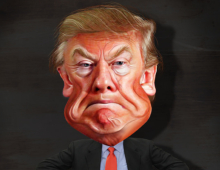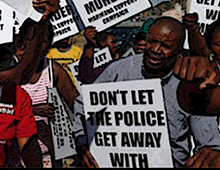Legendary Nigerian author Chimamanda Ngozi Adichie headlined the third annual Abantu Book Festival in Soweto this weekend. The acclaimed writer is the author of Purple Hibiscus, Half of a Yellow Sun, The Thing Around Your Neck, Americanah, and We Should All Be Feminists. She was in discussion with award-winning author Pumla Dineo Gqola at the Eyethu Lifestyle Centre in Mofolo Central.
Audience members packed into the venue and even though she was an hour late, the excitement was palpable. Fans formed a snaking queue to get their books autographed with one tweeting that Adichie is the “Beyoncé of the literary world”.
When the session finally began Adichie did not disappoint. She talked apartheid and Michelle Obama, feminism and fiction.
The writer found herself in hot water after an interview with Channel 4 in 2017 where she said the experiences of transgender women are different from those women born female.
“I think the whole problem of gender in the world is about our experiences. It’s not about how we wear our hair or whether we have a vagina or a penis. It’s about the way the world treats us, and I think if you’ve lived in the world as a man with the privileges that the world accords to men and then sort of change gender, it’s difficult for me to accept that then we can equate your experience with the experience of a woman who has lived from the beginning as a woman and who has not been accorded those privileges that men are,” she said at the time.
The backlash was severe, with many accusing her of transphobia although she later defended her comments saying she had “nothing to apologies for”. In March 2017 she attempted to clarify her comment with a Facebook post: “Perhaps I should have said trans women are trans women and cis women are cis women and all are women. Except that ‘cis’ is not an organic part of my vocabulary. And would probably not be understood by a majority of people. Because saying ‘trans’ and ‘cis’ acknowledges that there is a distinction between women born female and women who transition, without elevating one or the other, which was my point. I have and will continue to stand up for the rights of transgender people. Not merely because of the violence they experience but because they are equal human beings deserving to be what they are”.

On Friday, at the festival, she spoke about her position and views once again, insisting that people have different experiences. “Female bodied people have [different] experiences to those who are not. People who are not female bodied just have not shared those experiences…To acknowledge that does not mean to prioritise one experience over the other,” she said.
Gqola asked Adichie about her interviews with Hilary Clinton and most recently Michelle Obama. In April 2018 Adichie spoke to Clinton about her book What Happened, about being a ‘likeable’ politician, censorship and Trump. And just last week the author spoke to Obama about her book, Becoming Michelle Obama, how the former first lady grew up and the untimely death of her father. But Adichie again faced criticism for not asking the high ranking former first ladies the tough questions.
“I admire Hillary [Clinton] deeply and I am not going to ask her to take responsibility for what a man did…I was there to speak to Michelle Obama about her book, not about the drone strikes in Syria,” she said.
Adichie described her feminism as “populist, storytelling feminism” and was not at all perturbed when a celebrity like Beyoncé used the word ‘feminism’, hoping that it would lead to more young people engaging with it. She also talked about her own relationship with feminist discourse, practising it well before she really knew what it was.
“To be a feminist in a place like Nigeria is difficult. I’ve been known to have fierce conversations with the Igbo uncles in my village because there are some things that fundamentally don’t make sense. There are some things I just won’t do…. My feminism is rooted in my great grandmother who was headstrong,” she said.

Adichie insists that she does not care for feminist academic texts but for “the textured lives of feminist characters. Maybe that’s because I’m a storyteller”. She also praised Novuyo Rosa Tshuma, author of House of Stones, “Novuyo is a wonderful writer, she came to our workshop and disgraced all of us Nigerians,” she said.
Adichie is the author of Purple Hibiscus, which won the Commonwealth Writers’ Prize for best first book and Half of a Yellow Sun, which won the Orange Broadband prize for fiction. She has also published numerous short stories, essays and poems. She divides her time between Nigeria and the US, where she is pursuing graduate work in the African Studies program at Yale University.
ACTIVATE! Change Drivers and The Journalist will continue to keep you posted on Twitter, Instagram and Facebook. If you were not able to join the festival this year, there is always next year. In the meantime, stay updated by following us on social media. All images courtesy of Mmuso Mafisa and Abantu Book Festival.











Get the ultimate casino experience from the comfort of your home! Lucky Cola
CBD exceeded my expectations in every way thanks. I’ve struggled with insomnia for years, and after infuriating CBD like https://www.cornbreadhemp.com/pages/what-do-cbd-gummies-do-for-men because of the first time, I for ever knowing a full evening of relaxing sleep. It was like a weight had been lifted mad my shoulders. The calming effects were gentle after all intellectual, allowing me to drift slow naturally without feeling punchy the next morning. I also noticed a reduction in my daytime apprehension, which was an unexpected but receive bonus. The taste was a fraction shameless, but nothing intolerable. Overall, CBD has been a game-changer quest of my slumber and angst issues, and I’m appreciative to keep discovered its benefits.
trouver un mГ©dicament en pharmacie: kamagra pas cher – vente de mГ©dicament en ligne
п»їpharmacie en ligne france https://kamagraenligne.shop/# trouver un mГ©dicament en pharmacie
pharmacie en ligne france fiable https://kamagraenligne.shop/# Pharmacie en ligne livraison Europe
pharmacie en ligne fiable: Pharmacies en ligne certifiees – Pharmacie en ligne livraison Europe
mexican drugstore online
https://cmqpharma.com/# best online pharmacies in mexico
mexican rx online
mexican rx online: cmq pharma – mexican border pharmacies shipping to usa
mexican border pharmacies shipping to usa
http://cmqpharma.com/# mexico drug stores pharmacies
mexican border pharmacies shipping to usa
mexico drug stores pharmacies
https://cmqpharma.com/# п»їbest mexican online pharmacies
mexican pharmaceuticals online
purple pharmacy mexico price list: mexico pharmacy – reputable mexican pharmacies online
You have remarked very interesting points! ps nice site.Raise your business
mexico drug stores pharmacies [url=https://foruspharma.com/#]buying prescription drugs in mexico[/url] mexican mail order pharmacies
best canadian pharmacy [url=http://canadapharmast.com/#]trusted canadian pharmacy[/url] canadian family pharmacy
http://indiapharmast.com/# indian pharmacy paypal
https://indiapharmast.com/# india pharmacy
canadian pharmacy reviews: canadian pharmacy meds reviews – canada rx pharmacy
cheapest online pharmacy india: buy medicines online in india – top online pharmacy india
india online pharmacy [url=https://indiapharmast.com/#]Online medicine home delivery[/url] best online pharmacy india
top 10 online pharmacy in india [url=http://indiapharmast.com/#]mail order pharmacy india[/url] indian pharmacies safe
canadian pharmacy online: canada discount pharmacy – ed meds online canada
http://foruspharma.com/# purple pharmacy mexico price list
http://foruspharma.com/# purple pharmacy mexico price list
canada drugs online review [url=https://canadapharmast.online/#]canadian pharmacy india[/url] canadian pharmacy 24
mexican pharmaceuticals online [url=https://foruspharma.com/#]buying prescription drugs in mexico[/url] buying from online mexican pharmacy
legit canadian pharmacy online: medication canadian pharmacy – canada pharmacy
mexican mail order pharmacies: mexican pharmacy – mexican online pharmacies prescription drugs
http://foruspharma.com/# pharmacies in mexico that ship to usa
canadian pharmacy [url=https://canadapharmast.online/#]canadian pharmacy store[/url] canadian pharmacy price checker
https://indiapharmast.com/# buy medicines online in india
pharmacies in mexico that ship to usa [url=http://foruspharma.com/#]mexico pharmacy[/url] buying from online mexican pharmacy
reputable mexican pharmacies online: best online pharmacies in mexico – mexico pharmacies prescription drugs
https://clomiddelivery.pro/# cost generic clomid without dr prescription
п»їpaxlovid [url=https://paxloviddelivery.pro/#]Paxlovid over the counter[/url] paxlovid buy
http://clomiddelivery.pro/# can i buy cheap clomid tablets
ciprofloxacin generic [url=https://ciprodelivery.pro/#]cipro ciprofloxacin[/url] ciprofloxacin 500 mg tablet price
can you buy cheap clomid without rx: cheap clomid without dr prescription – can you buy cheap clomid pill
buy generic ciprofloxacin: buy generic ciprofloxacin – cipro for sale
https://amoxildelivery.pro/# how to get amoxicillin
https://doxycyclinedelivery.pro/# price doxycycline
doxycycline 40 mg india [url=https://doxycyclinedelivery.pro/#]rx doxycycline[/url] buy doxycycline 100mg online india
http://clomiddelivery.pro/# order generic clomid for sale
amoxicillin from canada [url=https://amoxildelivery.pro/#]amoxicillin for sale online[/url] where to buy amoxicillin 500mg
https://amoxildelivery.pro/# can you purchase amoxicillin online
doxycycline prescription coupon: doxycycline for sale usa – doxycycline over the counter usa
amoxicillin order online: amoxicillin order online – generic amoxil 500 mg
https://amoxildelivery.pro/# where can i get amoxicillin 500 mg
п»їcipro generic [url=http://ciprodelivery.pro/#]cipro[/url] cipro 500mg best prices
where to buy generic clomid prices: cost cheap clomid price – can i order generic clomid
buy cipro online canada: purchase cipro – ciprofloxacin
https://clomiddelivery.pro/# where to buy cheap clomid
http://amoxildelivery.pro/# how to get amoxicillin
https://ciprodelivery.pro/# buy cipro
purchase doxycycline online [url=https://doxycyclinedelivery.pro/#]doxycycline prescription coupon[/url] doxycycline rx coupon
http://ciprodelivery.pro/# buy ciprofloxacin over the counter
paxlovid for sale [url=https://paxloviddelivery.pro/#]paxlovid price[/url] paxlovid pharmacy
paxlovid for sale: paxlovid for sale – Paxlovid buy online
http://clomiddelivery.pro/# where to get generic clomid without prescription
http://ciprodelivery.pro/# ciprofloxacin 500mg buy online
doxycycline over the counter australia [url=https://doxycyclinedelivery.pro/#]doxycycline online uk[/url] doxycycline 50 mg price
https://doxycyclinedelivery.pro/# doxycycline 50 mg price australia
can you buy generic clomid without insurance [url=https://clomiddelivery.pro/#]can i order generic clomid no prescription[/url] where to get generic clomid without rx
paxlovid covid: п»їpaxlovid – paxlovid india
amoxicillin generic: generic amoxicillin cost – amoxicillin 500mg capsule cost
https://paxloviddelivery.pro/# Paxlovid buy online
buy doxycycline 11554 [url=http://doxycyclinedelivery.pro/#]vibramycin[/url] doxycline
paxlovid price: paxlovid cost without insurance – paxlovid pill
paxlovid pill: Paxlovid over the counter – paxlovid generic
https://paxloviddelivery.pro/# Paxlovid buy online
paxlovid covid [url=http://paxloviddelivery.pro/#]paxlovid buy[/url] paxlovid buy
buy cipro online usa: purchase cipro – antibiotics cipro
can i order generic clomid price: where can i get generic clomid without insurance – order clomid no prescription
buy cipro: buy cipro online usa – cipro for sale
ciprofloxacin generic: buy generic ciprofloxacin – ciprofloxacin generic price